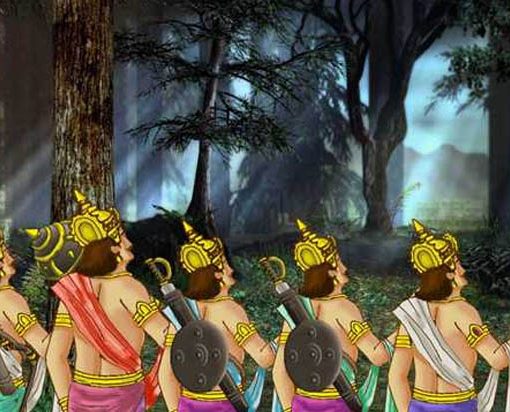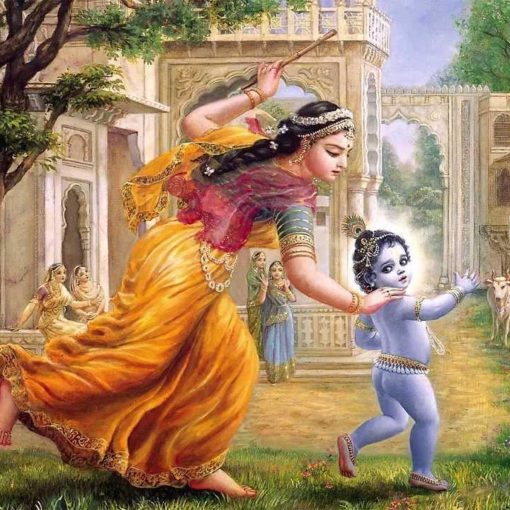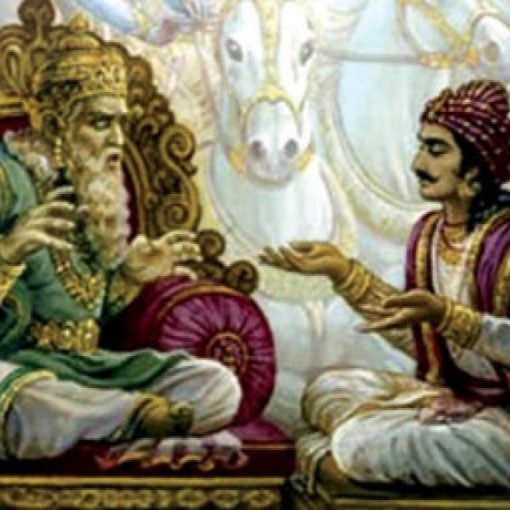It was now time for the princes to leave Droṇa’s school. To complete their training they had to pay their guru’s fees by offering him dakṣiṇa. Traditionally, the dakṣiṇa was determined by the guru himself. Droṇa assembled the princes and said, “There is only one thing I want. You should take King Drupada prisoner. Then bring him before me as your captive.”
The princes replied, “So be it.” They knew of their guru’s enmity with the king. Drupada and Droṇa had lived together as children under the Ṛṣi Agniveśya. Drupada had promised that when he inherited his kingdom he would bestow half of it on his dear friend Droṇa. Later, when they had both grown to maturity, Droṇa went to Drupada and reminded him of their friendship and the promise. Seeing the poor Droṇa standing before him, Drupada had said, “O luckless Brahmin, how do you consider me as your friend now? Past friendships are meaningless. Only equals can be friends. I am a great king and you are an indigent Brahmin. Do not try to invoke a long-dead relationship.”
Drupada had then laughed at Droṇa and offered him a little charity. Deeply insulted, Droṇa had left Pañchāla, Drupada’s vast kingdom, his mind fixed on revenge. The time for that revenge had arrived. Droṇa looked about at his accomplished students and knew that Drupada would soon regret his arrogance.
The princes mounted their chariots and sped toward Pañchāla. Accompanied by a large force of horsemen, they soon arrived at Drupada’s capital, Kāmpilya. Duryodhana and his brothers vied with one another to lead the attack. They rushed toward the city gates with weapons raised. Sending up cries, they burst into Kāmpilya along its main highway while the terrified citizens hid in their houses.
Outside the city Droṇa waited with the Pāṇḍavas. Arjuna had suggested to his brothers that they not accompany the Kauravas. “They will not be able to overpower the mighty Drupada,” Arjuna had said. “We should make our attack after theirs has been repulsed.”
Drupada heard the attacking Kauravas crashing through his city and came straight out of his palace, mounted on his huge, white chariot. Roaring with joy at the chance for battle, he charged at the head of his army to defend the city. He showered his enemies with forceful arrows. His speed and lightness of motion were such that the Kauravas thought they were facing many Drupadas. He careered fearlessly in his chariot and entered into their midst, his bow constantly drawn to a circle and his searing shafts flying in all directions.
The Pañchālas sounded thousands of conches, trumpets and drums, creating a noise that sounded like the roar of a tremendous lion. Drupada struck the Kuru princes with his arrows and sent them reeling. Seeing their king in the forefront of battle, the citizens came out of their houses to hurl clubs, maces and other missiles at the Kurus. The princes were surrounded by thousands of assailants and they felt oppressed and overwhelmed. They fled howling from the city with the Pañchālas in pursuit.
The Pāṇḍavas laughed. Arjuna said scornfully to Yudhiṣṭhira, “Here come the proud Kauravas, put to flight by Drupada. They are strong in words only. It is time for us to fight. You stay here. I shall go with the others.”
Yudhiṣṭhira remained behind with Droṇa. His four brothers flew toward Kāmpilya. Bhīma bounded along with mace held aloft, while Arjuna raced behind him on a chariot with Nakula and Sahadeva on either side. The Pañchālas were waiting for them and had blocked the city gates with a row of elephants. Bhīma struck at them with his club. With their heads smashed and covered in blood, the elephants fell to the ground like cliffs broken off by thunderbolts. Bhīma spun like a furious tornado amid the Pañchāla warriors. Elephants, chariots and infantrymen fell in the thousands. The Pāṇḍavas drove the hostile force back as a herdsman drives cattle.
Arjuna, keen to please his preceptor, released volleys of arrows at the immense Pañchāla forces. His straight-flying shafts came in an endless stream and sped unerringly at the enemy warriors. Arjuna resembled the all-devouring fire that appears at the end of an aeon. Protected on either side by his two brothers, he felled thousands of fighters.
Drupada raced to the head of his troops and they rallied with lion-like roars. Led by their king, they mounted a powerful counterattack against the Pāṇḍavas. Arrows, darts, spears and clubs rained down on the four brothers. Arjuna repelled all their missiles with his arrows. The Pañchālas enraged him with their furious attack and fought with redoubled energy. His foes could not mark any interval between his pulling an arrow from his quiver and bending his bow to fire it. All they saw was a constant stream of shafts speeding toward them. The mighty Pañchāla warriors shouted praises at Arjuna for his prowess.
Along with his commander-in-chief Satyajit, Drupada personally rushed toward Arjuna. Like the king, Satyajit was a warrior capable of contending with thousands of other warriors at once. He struck Arjuna with a hundred fierce arrows and sent up a great roar. Not tolerating the attack, Arjuna pierced Satyajit with ten arrows and simultaneously cut his bow to pieces with three more shafts. Seeing this wonderful feat, the other warriors cheered. Satyajit grasped another bow and immediately pierced Arjuna’s steeds as well as his charioteer. Arjuna again split Satyajit’s bow, then killed his horses and smashed his chariot to pieces.
Drupada came quickly to his commander’s assistance. A powerful exchange of arrows and other missiles followed between the king and Arjuna. Gradually Arjuna overpowered Drupada. He shattered the king’s bow, tore off his armor, felled his flagstaff and killed his horses. Seeing Drupada confounded, Arjuna threw down his own bow and took up a huge scimitar. He leapt down from his chariot and jumped onto Drupada’s, seizing him and holding the sword to his throat.
Bhīma had meanwhile been wreaking havoc among Drupada’s troops. Arjuna shouted to him to withdraw. They had achieved their aim and captured Drupada. The troops saw their king’s plight and fled in fear. Arjuna then dragged Drupada onto his own chariot and rode back toward Droṇa.
When Droṇa saw the captive king, he smiled. “So, O mighty king, do you now desire to revive our old friendship? It seems that your kingdom and wealth have become mine.”
Drupada squirmed and blushed. He looked down as Droṇa continued, “You need not fear for your life for I am a Brahmin and it is my duty to be ever forgiving. Indeed, I have always cherished an affection for you since we were children.”
Droṇa then ordered Arjuna to release Drupada. The king listened in silence as Droṇa continued. “I still desire your friendship, Drupada, but how can one who is not a king be a king’s friend? Therefore I have decided to allow you to keep half your kingdom. I shall take the other half.”
Drupada was in no position to argue. He knew that Droṇa’s martial power far exceeded his own–especially as he now had the mighty Kurus as disciples. There would be no question of defeating him in battle. Drupada nodded in assent. “You are a truly noble soul to act in this way, Droṇa,” he replied, summoning all his patience. “Great personalities like yourself are always magnanimous. I, too, desire your friendship. Let us live peacefully, each ruling his own half of the Pañchāla kingdom.”
Drupada had Brahmins perform appropriate rituals and bestowed the northern half of his kingdom upon Droṇa, who then left with the Pāṇḍavas for Hastināpura. Drupada burned with humiliation. Somehow he had to avenge his honor. Absorbed in thought, the king returned to his palace.
As they returned to Hastināpura, Droṇa rode on Arjuna’s chariot and spoke to him affectionately. He loved this prince as dearly as his own son, and he knew there was nothing Arjuna would not do for him. Droṇa said, “O hero, you are now the best of all bowmen in this world. Although you have repaid me by defeating Drupada, I will ask one more thing from you as dakṣiṇa. You must fight with me when I come to fight with you.”
Arjuna was surprised. How could he ever fight with his teacher? Still, he replied without hesitating, “It shall be so. I am always your servant.”
Reference:-https://vedabase.io/en/library/mbk/1/6/





